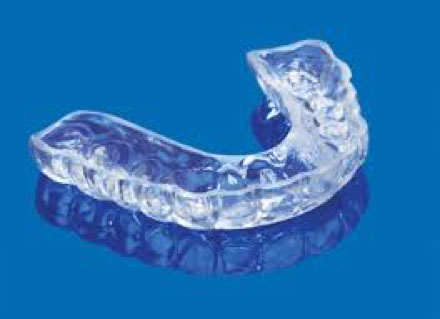Bite Splints, Mouthguards and Sleep Apnea/Snoring Devices
Bruxism and Bite Splints
Bruxism is the term that refers to a repetitive and unintentional grinding and clenching of the teeth; people are often unaware that they have developed this habit. Bruxism may be mild and may not require treatment, however, it can be frequent and severe enough to lead to jaw disorders, headaches, damaged teeth and other problems. While bruxism can occur during the day or night, it is bruxism during sleep that causes the majority of health issues. It is one of the most common sleep disorders.
Bruxism can result in abnormal wear patterns and fractures in the teeth. It is the leading cause of occlusal trauma and a significant cause of tooth loss and gum recession.
What causes teeth grinding (bruxism)?
Doctors do not completely understand the causes of bruxism. Although this habit is unintentional, oral health specialists often point to excessive stress as typical causes of bruxism. There is also some evidence that malocclusion of the teeth or TMJ (tempromandibular joint) disorders are linked to bruxism as well.
What are the complications of teeth grinding (bruxism)?
Extensive bruxism may lead to:
- Damage to teeth (including restorations and crowns) or jaw
- Facial pain
- Tension-type headaches
- Temporomandibular disorders. This occurs in the temporomandibular joints (TMJs), located just in front of the ears and felt when opening and closing the mouth. It can lead to arthritis of the temporomandibular joints.
What are the treatment options of teeth grinding (bruxism)?
If the Bruxism is severe, treatment options may involve stress management or other strategies that promote relaxation, such as exercise and meditation.
Dental approaches - a mouthguard or protective dental appliance (splint) can be made to prevent damage to the teeth. A splint reduces the probability of causing damage to the teeth.

Mouthguards
Mouthguards are an essential item if you play any contact sports. They help to lessen the forces caused by blows to the head, helping to protect your teeth and jaw from fractures. We have different mouthguards available depending on your age and what sport you need it for. We also have different colours and designs to choose from. If you wish, your name and telephone number can be printed on the inside of the mouthguard.
Sleep Apnea/Snoring Devices
Obstructive Sleep Apnea (OSA) is a Sleep Disordered Breathing (SDB) condition which occurs during sleep. It occurs when the airway becomes completely blocked and breathing stops. The brain then detects the lack of oxygen and prompts a momentary arousal to draw breath. OSA sufferers may experience many apnea episodes per night but they are unlikely to remember any of them. If the sufferer lives alone or sleeps separately they may not be aware of their condition, Signs that you have OSA include you or your partner may notice that you snore, feeling unrefreshed upon waking, feeling sleepy during the day or inability to concentrate and retain information.
Snoring is often no greater problem than the noise itself. However if you experience any of the other symptoms above you may need to consult a sleep doctor to be assessed for Obstructive Sleep Apnea.
If you are diagnosed with mild to moderate sleep apnea you can benefit greatly from a Mandibular advancement device such as a Somnomed device. These appliances consist of two dental plates, which look similar to an orthodontic retainer or a mouthguard. It is worn in the mouth during sleep to prevent the soft throat tissues from collapsing and obstructing the airway. Studies show these devices improve sleep quality giving you more energy; they can vastly improve the quality of your life.
At our practice we take impressions and measurements of your bite and jaw relationship so a custom made appliance can be constructed for you.
